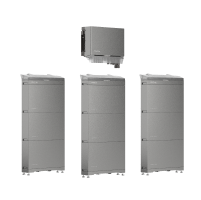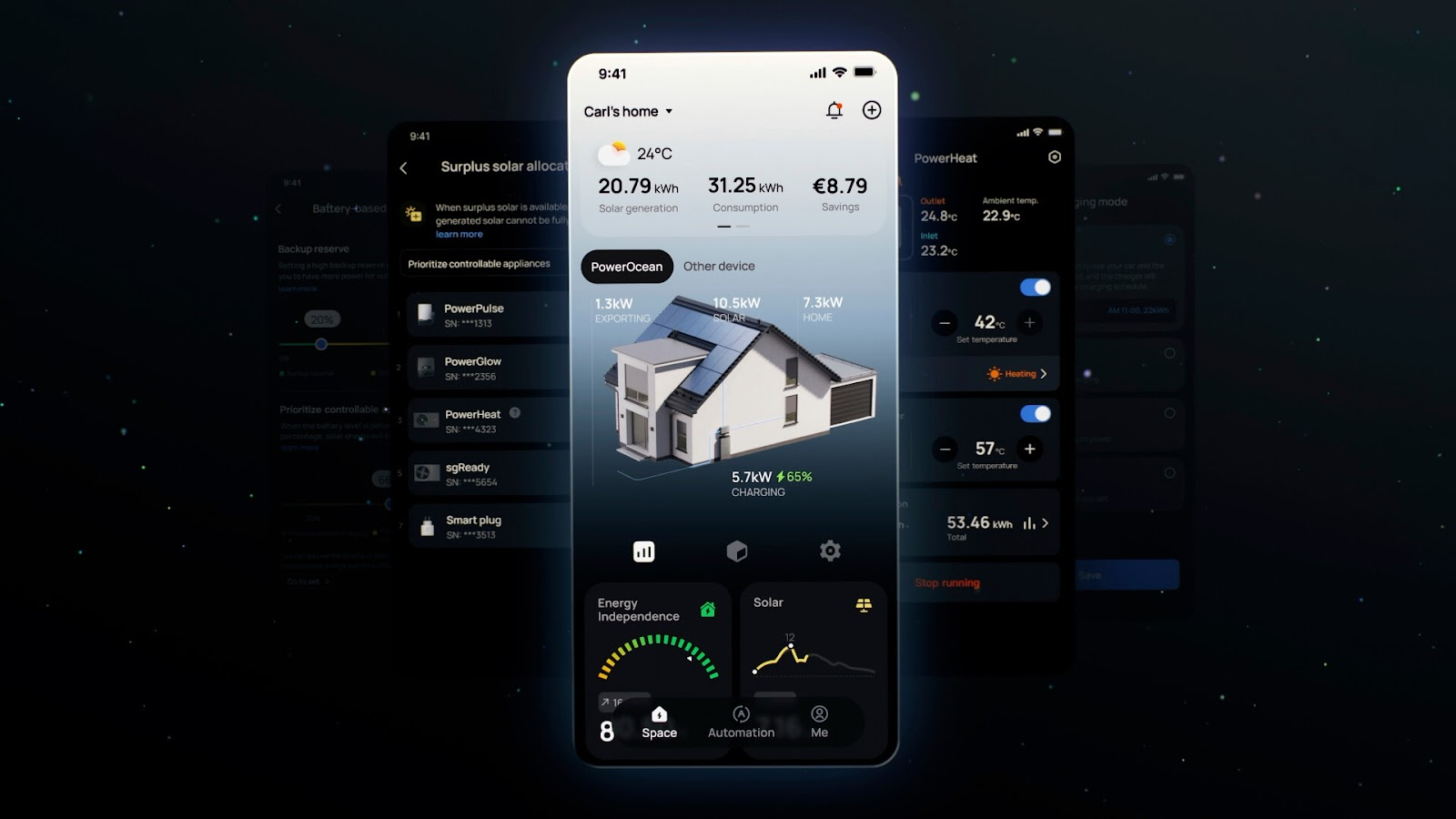Solar and Power Storage UK Trends: How Home Batteries Are Changing Energy Use
The power storage UK market is expanding rapidly, with more than 1,600 UK battery storage projects already active. As renewable energy becomes conventional, more households and businesses are expected to pair PV systems with batteries for low-carbon emissions and grid independence, shaping overall energy use in the UK.
How Solar Power and Storage Are Evolving in the UK
Solar capacity in the UK is growing rapidly. In 2025 alone, the country completed around 2 GWp of new solar power and is targeting 3.7 GWp by year-end. This already eclipses 2024’s totals and highlights how seriously the UK is treating solar power and storage as part of its long-term renewable energy strategy.
In addition to installing PV systems, UK homeowners are now starting to install battery storage systems. What was an optional choice before is now seen as a necessity, as it helps balance the grid. Paired with home PV units, it can now store surplus energy generated during the day for use during the evening, in case of emergencies.
These shifts in power generation and storage will allow consumers to save on their energy bills, have increased resilience, and make household donations that are leaning towards sustainability.
With the growing need for power storage and PV systems, EcoFlow and its products are making an impact towards sustainability and power independence. Products like the EcoFlow PowerOcean allow homeowners to store solar energy, which they can use during peak grid hours.
The Momentum Behind UK’s Solar and Power Storage Battery Deployment
In 2025, the UK has already installed around 2GWp of new solar projects. By the end of the year, the country aims to have 3.7 GWp of utility-scale ground-mounted solar PV systems under construction. These large solar and power storage projects now account for 70% of the country's total solar power capacity, with 1.5 GWp already installed and contributing to the grid.
Rooftop-mounted PV systems are also growing steadily at a rate of 20% year-over-year. The government is also offering incentives for homeowners to install roof-mounted solar-powered systems in their homes. With this mandate, the UK is moving towards better sustainable energy.
For homeowners, this momentum means better access to affordable technology, more competitive installers, and smarter solar and power storage battery solutions. Strong national targets are helping to ensure that UK households can tap into cleaner, more sustainable power sources and reduce their reliance on traditional grid electricity.
The Rise of Power Storage UK Systems
UK omeowners are now starting to install power storage battery units to conserve power and have a backup source during emergencies and peak grid hours. To date,the country has two main forms of power storage:
- Utility-scale power storage: Grid-tied and stores excess energy generated by large solar or wind sites, releasing it when demand is high or when renewables dip.
- omestic battery storage: Systems installed in individual homes, such as EcoFlow’s PowerOcean Three-Phase and Single-Phase units.
Together, these solutions are expanding UK battery storage capacity and helping the grid cope with a higher share of renewable power. In turn, they help homeowners save up on electricity bills as well as lessen grid dependence by using stored energy during peak and high-demand hours.
Domestic Battery Storage for UK Households
With the rise of roof-mounted PV systems and the Government’s mandate, home batteries are becoming more popular each year in the UK. Aside from government mandates and incentives, numerous benefits can arise from the use of domestic battery storage.
First and foremost is less reliance on your power grid. When you rely on the grid for your power, you tend to accumulate more charges, especially during peak hours. Having a backup power storage will allow you to power your home without the need for the grid and go back to using grid-connected sources during off-peak hours.
The same is true when you connect a PV system to your power storage. You can generate power through your PV and store it in your battery, like the EcoFlow PowerOcean, and use it during the evening or peak hours to save.
You can also save more by pairing your domestic battery storage with your EV charging wallbox. For example, if you are using the EcoFlow PowerPulse and PowerPulse2, you can connect them to your PowerOcean unit and use the stored energy rather than connecting to your grid.
Solar Plus Storage Hybrid Projects Across England and the UK
Across the UK, a growing number of solar resource projects are either completed or under construction. Many of these are large solar farms built in response to government targets for renewable, solar-powered energy. These sites link multiple PV systems together and connect them to battery storage units, creating solar-plus-storage hybrids that can store energy for use during peak grid hours or emergencies.
Because most solar farms with battery storage share infrastructure and grid connections, they benefit from lower overall costs and more efficient operation. They can charge batteries when generation is high and demand is low, then discharge when the grid is under pressure. This flexibility allows project owners to optimise revenues while supporting grid stability.
The same principle applies on a smaller scale for homeowners who install PV and storage systems. A rooftop array paired with a home battery can store excess daytime generation and power the home in the evening or during high-tariff periods, helping reduce electricity bills and reliance on the grid.
Across England, flagship battery storage projects and smaller community schemes in places such as Beckley show how quickly local areas are embracing solar-plus-storage to cut costs and improve energy security.
What kind of product or solution are you interested in?


Policy and Regulation Shaping the Future of UK Battery Storage and Solar Industry
With the rise of battery storage and PV systems in the UK, Ofgem, and ESO have introduced new frameworks. These solar and battery frameworks license batteries, determine tariffs, clarify regulations for co-located systems, and promote investment in electricity storage projects. There is also the issue of ED3 price control regulations, which are scheduled to take effect on April 1, 2028. DERs can now participate properly and focus on flexibility services related to power sources.
For households, it is a great way to signal that domestic batteries and small-scale solar systems can have more opportunities. Opportunities to not only feed households but also the power grid in the future. This will allow homeowners to calibrate and maintain their energy efficiency rating as well as manage feed-in tariffs.
Paired with government subsidies and incentives, it will enable the growth of wide-scale and residential battery storage and solar systems. This will also provide more flexibility for people who have installed their systems for their energy usage moving forward.
What Power Storage UK Trends Mean for Households
These trends in solar power and storage can ease the pressure from high electricity prices among homeowners. Solar-plus-storage systems give more control over when one can buy from the grid and when they use stored energy. As new regulations, subsidies, and incentives continue to roll out, domestic battery storage adoption is expected to rise sharply over the next few years.
Battery storage systems also improve energy security at home. Even if they cannot power every appliance during an outage, they can keep essential loads running for a period of time. As more products become compatible with home battery systems, it’s becoming easier to integrate solar and storage into wider smart home setups that automatically manage when and how energy is used.
To get the most from a smart home powered by solar and batteries, it helps to have a monitoring and control system that can see all connected devices in one place. Tools like the EcoFlow PowerInsight and app allow you to track real-time usage, manage your solar and power storage system, and optimise when you charge or discharge your battery for maximum savings and efficiency.

UK Solar Power and Storage Trends: The Takeaway
Solar power and energy storage systems are steadily moving into the mainstream in the UK. By pairing a power storage battery with a rooftop PV system, households can build a more practical, reliable and future-focused power setup. The UK government is encouraging this shift by supporting more sustainable choices and greater energy independence through solar systems and home battery storage.
Request a consultation with EcoFlow today and get expert advice on PV system design and domestic battery storage installation tailored to your home and needs.
FAQ Section
How is electricity stored in the UK?
Excess electricity is stored either in large-scale energy storage facilities or through home battery storage systems. Home solar setups also often use lithium-ion batteries to store excess power for later use.
Why does the UK adopt power battery storage solutions?
The UK adopts battery storage to balance renewable energy supply, reduce grid strain, and store excess solar or wind power for later use. This enhances energy security, reduces costs, and facilitates the transition to a low-carbon grid.
Is battery storage worth it in the UK?
Yes, there are now regulations and incentives when installing home battery storage units. Battery storage can also be worthwhile in the UK by storing excess solar energy, thereby lowering reliance on the grid and reducing bills.
Can I install domestic battery storage without solar panels in the UK?
Yes. Home batteries can be installed without solar and charged from the grid. However, pairing them with PV provides greater savings and better energy independence.
How long does a typical home battery last in the UK?
Most modern domestic battery storage systems offer 6,000+ cycles and a 10-year warranty. Depending on usage, they often last 10–15 years while maintaining strong performance.



